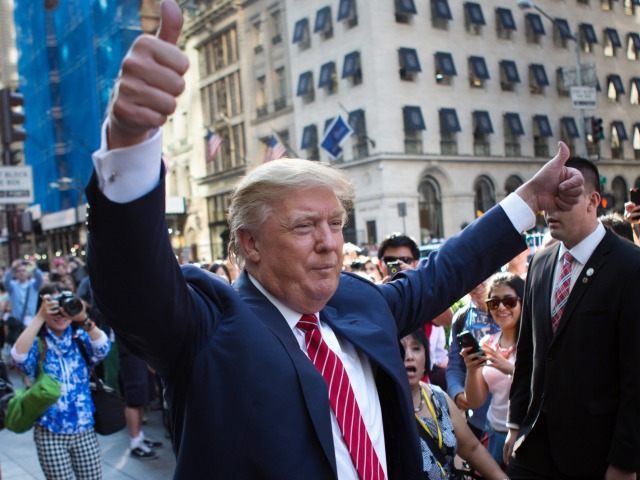A new poll out on Thursday obliterates the latest mainstream media narrative confronting billionaire Donald Trump: That he can’t get majorities, but can only get pluralities, in election results.
The poll of New York state, conducted by Boston’s Emerson College, has Trump dominating his only two remaining competitors in the Empire State with 65 percent of Republicans there backing him. Only 12 percent back Sen. Ted Cruz (R-TX), Trump’s closest competitor, and just one percent support Ohio Gov. John Kasich.
The poll was conducted over three days, March 14 to March 16, during two days of which Sen. Marco Rubio (R-FL) was still in the race. Rubio dropped out on the evening of March 15 after an abysmal performance in his home state of Florida, where Trump walloped him by more than double digits. In the portion of the poll conducted before Rubio suspended his campaign, the pro-amnesty Floridian got just four percent in New York. Nineteen percent chose someone else or were undecided.
In a video accompanying the polling release, Emerson College Polling Society adviser Spencer Kimball called Trump’s towering over Cruz and Kasich a “commanding lead.”
In a direct matchup between just Cruz versus Trump, Trump still wins New York 69 percent to 25 percent—something that will probably make Cruz backers a bit uneasy, as they’ve been hoping that a head-to-head with Trump would be more beneficial to the Texas senator.
Trump’s favorables are also higher than Cruz’s or Kasich’s ratings. “Trump has the highest favorable ratings with GOP voters, 71%/23%, followed by Cruz at 52%/44% and Kasich at 54%/34%,” the polling release states. “Consistent with other primaries, Trump supporters are the most loyal, with 89% of those who see him favorably planning to cast their ballot for him. In contrast, only 21% of Republicans who have a favorable opinion of Cruz say they will vote for him.”
Former Secretary of State Hillary Clinton, in the words of Emerson’s release, is also “trouncing” Sen. Bernie Sanders of Vermont in the Democratic primary. Clinton takes 71 percent compared to Sanders’ 23 percent, a 48-point lead for the former U.S. Senator from New York—who was elected after her time as First Lady to President Bill Clinton.
In a general election matchup, either Democrat wins easily against any of the remaining three Republicans—although Trump stands the best chance of beating either Clinton or Sanders in the Empire State. At this time, Clinton beats Trump 55 percent to 36 percent in New York,while Sanders beats Trump 53 percent to 36 percent. Clinton beats Cruz, meanwhile, 61 percent to 30 percent.
This massive lead for Trump in New York comes as the state primary looms around the corner from now on April 19. The delegate rich Empire State offers its 95 delegates proportionally, but if Trump wins this big, he could conceivably get an even bigger slice of the pie than many in the media think he will get.
Between now and then, Republicans in Arizona, Utah, and Wisconsin will make their presidential selections. Arizona’s 58 delegates are winner-take-all, while Utah’s 40 delegates are awarded proportionally. Wisconsin’s 42 delegates are awarded on a winner-take-all basis statewide and by congressional district.
Trump has a massive lead in Arizona polling, though no new polling has been done since Rubio dropped out. Both he and Cruz are hitting the trail there this weekend. Cruz is holding a press conference on the U.S. border with Mexico and several events throughout the state on Friday, while Trump is set to hold rallies over the weekend in Arizona. Previous Trump rallies in Phoenix have drawn thousands and thousands of people.
Arizona and Utah both vote this coming Tuesday, on March 22, while Wisconsin votes two weeks later on Tuesday, April 5. Then New York is two weeks after that.
It is currently mathematically impossible for Kasich to win the nomination outright before the convention, since he can’t get to 1,237 delegates at this point. For Cruz, it’s a serious uphill climb, and Trump seems to be coasting all the way there. If Trump pulls in just 42 percent of delegates from here on out, per a New York Times analysis published late Wednesday, he can hit the 1,237 mark easily by the convention.
Several Republicans, including Florida Gov. Rick Scott, are saying it’s now time for the GOP to coalesce behind Trump as the nominee heading into the general election.

COMMENTS
Please let us know if you're having issues with commenting.